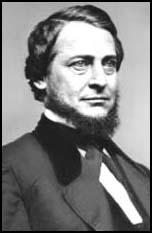Clement Vallandigham

Clement Vallandigham was born in Lisbon, Ohio, on 29th July, 1820. After attending Jefferson College and the Union Academy, he studied law and was admitted to the bar in 1842. Vallandigham worked as a lawyer in Dayton, Ohio and in 1845 became a member of the State house of representatives.
A member of the Democratic Party, Vallandigham was elected to Congress in 1858. A supporter of state's rights and slavery, and on the outbreak of the American Civil War he became a leading opponent of President Abraham Lincoln. With Fernando Wood, the mayor of New York, he helped to form the Peace Democrats (Copperheads). Vallandigham's views were unpopular in Ohio and he was defeated in the 1862 election.
In 1863 Vallandigham made a serious of speeches attacking the administration of President Abraham Lincoln. He was arrested in May, 1863 and charged with violating general order no. 38 which threatened punishment to those declaring sympathy for the enemy. Found guilty by a military commission, he was sentenced to imprisonment. Soon afterwards Lincoln intervened and commuted his sentence to banishment behind the Confederate Army front lines.
After the war Vallandigham returned to Ohio and became a leading critic of the Radical Republications. Clement Vallandigham died on 17th June, 1871, after accidentally shooting himself with a firearm that was an exhibit in a murder trial.
Primary Sources
(1) Clement Vallandigham, speech in New York City (7th March, 1863)
The day after the Battle of Bull Run, by a vote unanimous save two, Congress declared that the sole purpose of the war should be the maintenance of the Constitution, restoration of the Union, and the enforcement of the laws; and when these objects were accomplished, the war should cease, without touching the domestic institutions, slavery included, in the Southern states.
That pledge was given, and under it an army of 600,000 men was at once raised; and it was repeated in every form till toward the close of the second session of Congress. Then the Abolition senators and representatives began first to demand a change in the policy of the administration, they began to proclaim at the war must be no longer for the Union and the Constitution but for the abolition of slavery in the Southern states.
Now, sir, I repeat it and defy contradiction, that not a soldier enlisted, out of the first 900,000, for any purpose than the restoration of the Union and the maintenance of the Constitution. There was not one single officer, so far as his public declarations were concerned, whatever may have been the secret purposes of his heart, that did not openly declare that the moment this object was changed to the abolition of slavery, he would throw up his commission and resign.
